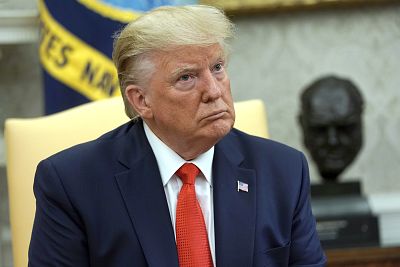The House committee passed a resolution Thursday that would set the outlines for future impeachment investigation hearings.
WASHINGTON — The House Judiciary Committee took a big step Thursday morning in its ongoing investigation into whether to recommend the filing of articles of impeachment against President Donald Trump, passing a resolution that set procedures and rules for future impeachment investigation hearings.
 ADVERTISEMENT
ADVERTISEMENT
 ADVERTISEMENT
ADVERTISEMENT
The resolution passed along party lines, 24-17.
"What we are doing with this resolution is simply putting into effect certain procedures to make that investigation more effective," House Judiciary Committee Chairman Jerry Nadler, D-N.Y., told NBC News earlier this week, saying the move was needed because "the inquiry is getting more serious."
Under the resolution, Nadler would be able to designate hearings run by the full committee and its subcommittees as part of the impeachment investigation. The committee's lawyers would also be able to question witnesses for an additional hour beyond the five minutes that are allotted to each member of Congress on the panel.
Additionally, the president's lawyers would be able to respond in writing to evidence and testimony presented to the committee, and evidence can also be received in closed session.
"This is part of a natural evolution and we have laid that out," a Democratic aide told reporters Monday. "The committee has intensified its investigation, the evidence has accumulated. The Mueller hearings were an important inflection point for the members, and this is the next step in the process."
The first hearing that the Judiciary Committee has scheduled in which the procedures would be in effect is slated for Sept. 17, when former Trump campaign manager Corey Lewandowski is scheduled to testify. The committee has also subpoenaed Rick Dearborn, former White House deputy chief of staff for policy, and Rob Porter, former White House staff secretary, to testify that day as well. The White House has previously blocked key witnesses from appearing before Congress.
While Democrats have not set a deadline for recommending articles of impeachment, staffers have suggested a pre-election year timeframe.
"I think it's fair to say it's the goal by the end of the year, but it's not a hard and fast deadline. That's our goal," the aide said.
Nadler himself has been less definitive on a potential timeline, telling NBC's Geoff Bennett this week only: "I don't know. I'd like to do it rather rapidly."
He added that the committee was now weighing these "very specific procedures" because "the inquiry is getting more serious."
There has been significant confusion among lawmakers about the status of the investigation. Nadler said before Congress's six-week summer recess that the panel was already in the midst of conducting an impeachment inquiry. Other lawmakers have said that that hasn't been made clear.
"It has been an impeachment inquiry, and it continues to be," Nadler said this week. "We have said that this is — and we've told the courts and we've said it in the hearings — that we are examining the various malfeasances of the president, with the view toward possibly, the possibility of introducing, of recommending articles of impeachment to the House. That is what an impeachment inquiry is."
The Democratic aide briefing reporters Monday echoed Nadler. "This committee is absolutely in an impeachment investigation," said the aide, who asked not to be identified, adding that the panel is "going full steam ahead."
Yet House Speaker Nancy Pelosi's careful public stance on impeachment has not changed. "The public isn't there on impeachment," she reiterated to House Democrats during a conference call in late August — though she didn't close the door on the possibility of moving forward in the future.
Asked Monday if she agreed with Nadler's statement that impeachment proceedings have already been taking place, she avoided answering directly. "I really don't know what the chairman said, I do know that we have been on a path of investigation and that includes the possibility [of] legislation or impeachment," she told reporters.
Pelosi also said that she had signed off on Nadler's decision to hold the vote on the resolution Thursday to establish the panel's impeachment investigation procedures.
"We have been in an impeachment investigation in that we have been investigating whether or not the Judiciary Committee is going to recommend articles of impeachment to the full House," Rep. Pramila Jayapal, D-Wash., a member of the Judiciary panel, told reporters this week. "This allows us to formalize that and also allows us to utilize slightly different procedures that will be helpful to us as we go through an investigation because the five-minute back and forth is very difficult."
The Congressional Progressive Caucus, of which Jayapal is a co-chair, took an official position Tuesday supporting an impeachment investigation.
More than half of the House Democratic caucus —134 out of 235 — have publicly backed an impeachment inquiry, including 17 out of the 24 Democrats on the Judiciary Committee.
Impeachment was a major issue during congressional town halls over the August congressional recess as a significant number of House Democrats, especially freshmen members, continued to wrestle with the issue.
Republicans continued to argue that Democrats need to take an official vote to begin any type of inquiry.
"The House of Representatives is not engaged in formal impeachment proceedings, as House Democrat leaders continue to note. Formal impeachment proceedings have always been authorized by a vote of the full House, which Speaker Pelosi has been careful not to allow," the top Republican on the House Judiciary Committee, Rep. Doug Collins, R-Ga., said Wednesday, calling the panel's planned Thursday action "a meaningless reiteration of existing committee authorities, allowing the chairman to keep this story in the news when moderate Democrats simply want it to go away."











